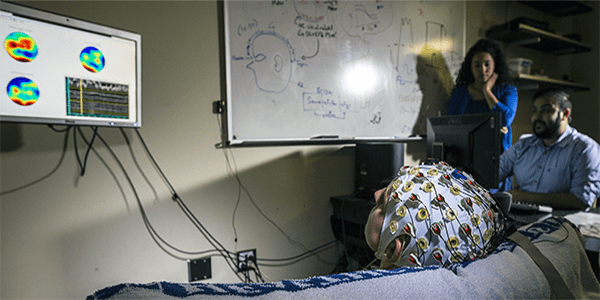Photo: University of Washington (UW) Bioengineering students and Center for Sensorimotor Neural Engineering (CSNE) members, Nile Wilson and Dev Sarma, conduct an experiment measuring electrical activity in a test subject’s brain using an EEG (electroencephalogram) cap. This experiment took place in the lab of CSNE Co-Director Rajesh Rao, who is also adjunct faculty in bioengineering. Credit: Mark Stone, CSNE.
UW Bioengineering has formally announced neural engineering as a research area, in recognition of new hires, expanding opportunities and the department’s growing leadership in the field. Neural engineering joins the department’s five other research focus areas, which include:
• Biomaterials and regenerative medicine
• Instrumentation, imaging and image-guided therapy
• Molecular and cellular engineering
• Systems, synthetic and quantitative biology
• Technology for expanding access to health care
With this focus on neural engineering, BioE is pursuing multidisciplinary projects that integrate expertise from diverse fields of research, including electrical engineering, computer science and engineering, protein engineering and regenerative medicine. The goal of this work is to improve quality of life for patients with neurological conditions including stroke, brain and spinal cord injury, multiple sclerosis, epilepsy, autism, hearing and vision loss and psychiatric illnesses.
UW bioengineers seek to address these conditions by advancing understanding of the underlying causes of these complex health conditions. They apply this knowledge to develop technologies including optogenetic tools for brain monitoring, stimulation and recording, and bi-directional brain-computer interfaces that enhance neurological function. These treatments and tools could reverse paralysis, restore lost sensory abilities and improve options to treat cognitive impairment.
In 2016-17, BioE announced hires of three new tenure-track faculty to join UW’s teams making groundbreaking advancements in neural engineering, including brain-machine interfaces, neuronal plasticity and neuronal learning. This complimentary cluster of faculty includes Andre Berndt, Azadeh Yazdan-Shahmorad and Amy Orsborn (starting September 2019).
The hires represent a model partnership between BioE, EE, the College of Engineering and UW Medicine. Aside from UW Electrical Engineering, other partners in the hire of the neuroengineering faculty include: UW’s Center for Sensorimotor Neural Engineering (CSNE), University of Washington Institute for Neuroengineering (UWIN), the Washington Research Foundation (WRF), the Washington National Primate Research Center (WaNPRC), UW’s Molecular Engineering and Sciences Institute and UW’s Institute for Stem Cell and Regenerative Medicine.
BioE acknowledges enthusiastic support from UW leadership in making these hires possible, and for propelling its prominence as a major center for neural engineering research. “These hires have already turned heads in the field and will cement UW’s position as one of the top institutions in neural engineering,” said Rajesh Rao, co-director of UW’s Center for Sensorimotor Neural Engineering and professor of computer science and engineering for a 2016 BioE article announcing the hires.
Full list of BioE core faculty performing neural engineering research:



